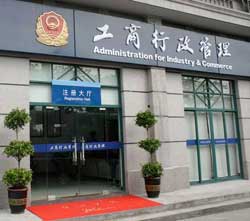
The move makes the company the latest foreign firm to face Beijing's scrutiny, in fields from computing to baby milk.
"According to legal regulations, the State Administration for Industry and Commerce (|SAIC) has set up a case to investigate Microsoft for alleged monopoly actions," the agency said in statement on its website.
"The inquiry centres on its Windows operating system - which is used on the vast majority of computers in China - and the Office suite of programs," the statement said.
The SAIC says an earlier inspection considered allegations by companies that Microsoft bundled its products for sale and failed to disclose information about the software, causing problems with compatibility.
The SAIC could not eliminate the suspicion that Microsoft's actions are anti-competitive", the statement added.
In May this year, China also banned the use of Microsoft's Windows 8 operating system on all new government computers, amid reports alleging security concerns, following the United States indictment of five members of a Chinese military unit for allegedly hacking US companies for trade secrets.

The announcement came after Microsoft said it was under investigation in China, without disclosing details and state media reported authorities had visited four of Microsoft's offices.
The SAIC confirmed officials visited Microsoft offices in Beijing, Shanghai, southern metropolis Guangzhou and southwest Chengdu city. The investigation was continuing, it said, but gave no timeline.
"We aim to build products that deliver the features, security and reliability customers expect, and we will address any concerns the Chinese government may have," Microsoft said in a statement.
"Microsoft's operating system software occupies a 95% share of the market in China, forming a de facto monopoly," the National Business Daily said.
Under China's anti-monopoly law, which came into effect in 2008, violators can be fined one to 10% of their previous year's sales revenue.
Microsoft has a dominant market position in terms of operating systems, which might be bundled together with other products, for example its Office series," You Yunting, a lawyer and partner of Shanghai DeBund Law Offices, told AFP.
Microsoft has previously faced anti-trust investigations in other markets for tying the company's Windows system to its products.

"The European Commission fined the Microsoft $731m in March last year for failing to offer users browser choices beyond its own Internet Explorer.
The probe comes amid what appears to be greater scrutiny of foreign firms doing business in China.
Last week, state media said China was preparing to announce US chip maker Qualcomm has monopoly status in the mobile phone chip market. The government agency reportedly behind the move declined to comment.
China's commercial hub Shanghai last week launched a police investigation of a unit of US food supplier OSI Group after a media report alleged its Shanghai factory, which supplied fast food giants such as McDonald's and KFC, used expired meat.
Since last year, China has launched sweeping probes into alleged wrongdoings by foreign companies in several sectors, including the pharmaceutical and baby milk powder industries.
Chinese authorities carried out an investigation of British drugmaker GlaxoSmithKline following allegations it systematically offered bribes to doctors and hospitals and passed the cost on to consumers through high prices.
Following a 10-month probe, police said in May that GSK's former Head of China operations and two other executives authorised the bribery.
Last August, China fined six baby formula producers - all but one of them foreign - a total of $108m for price-fixing.
Source: AFP via I-Net Bridge

For more than two decades, I-Net Bridge has been one of South Africa’s preferred electronic providers of innovative solutions, data of the highest calibre, reliable platforms and excellent supporting systems. Our products include workstations, web applications and data feeds packaged with in-depth news and powerful analytical tools empowering clients to make meaningful decisions.
We pride ourselves on our wide variety of in-house skills, encompassing multiple platforms and applications. These skills enable us to not only function as a first class facility, but also design, implement and support all our client needs at a level that confirms I-Net Bridge a leader in its field.
Go to: http://www.inet.co.za